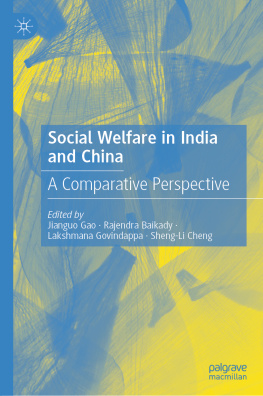First published 1993 by Transaction Publishers
Published 2017 by Routledge
2 Park Square, Milton Park, Abingdon, Oxon 0X14 4RN
711 Third Avenue, New York, NY 10017, USA
Routledge is an imprint of the Taylor & Francis Group, an informa business
Copyright 1993 by Taylor & Francis.
All rights reserved. No part of this book may be reprinted or reproduced or utilised in any form or by any electronic, mechanical, or other means, now known or hereafter invented, including photocopying and recording, or in any information storage or retrieval system, without permission in writing from the publishers.
Notice:
Product or corporate names may be trademarks or registered trademarks, and are used only for identification and explanation without intent to infringe.
Library of Congress Catalog Number: 92-29895
Library of Congress Cataloging-in-Publication Data
Epstein, William M., 1944-
The dilemma of American social welfare /William M. Epstein
p. cm.
Includes bibliographical references and indexes.
ISBN 1-56000-088-0
1. Social serviceUnited States. 2. United StatesSocial policy1980- I. Title.
HV91.E67
361.973dc20
92-29895
CIP
ISBN-13: 978-1-4128-4586-1 (pbk)
ISBN-13: 978-1-56000-088-4 (hbk)
For my parents, Lillian and Harry
In memorium
Kiernan F. Stenson
1927-1991
This book tells the story of how science, social need and citizenship are betrayed in the contemporary culture of the United States. It speaks to the audience that listens with wonderment to professional claims for expertise in handling Americas social problems while witnessing then-steady growth.
The social sciences that are most germane to contemporary social policyeconomics, psychology, the policy sciences, and sociologyhave not provided credible information or impartial, objective advise. In their applied formspsychiatry, psychology, social work, criminology, public administration, and so forththey have largely avoided rigorous tests of their advice. Indeed, social science research and social service agencies have propagated the pleasing myth of social efficiencythat just a little bit, wisely spent, is enough to solve social problems in the United States. This myth of social efficiency dominates the discourse of social welfare. Superficial responses to serious deprivations will postpone a humane civic culture for the United States until some un-foreseen economic eventperhaps cheap, accessible solar powerfortuitously coincides with a revolution in human consciousness to solve the nations problems. Yet until the second coming of a compassionate technology, the United States is stuck with a dilemma.
The books return to the critical tradition in the social services is made as an act of faith within the community of scholars concerned with the conditions of society. The utility of a scholarly role rests on its independent relationship to its culture, providing thoughtful interpretations of social policy. Its meanest role is played out as an apologist for that societys failures.
The task of depriving the human services of their scientific cachet is a political event with professional overtones. The issue of method, of the criteria for proving effectiveness, is an issue of social policy, the broad choice of strategy to resolve social problems. To mask failure as success behind pliable tests of effectiveness is knowingly to create misleading myths in both of its two senses: importantly as a decisive metaphor, that is, as propaganda, and less importantly as a fictional account of an event.
I am indebted to a number of colleagues and mentors for their valuable comments on earlier drafts: Robert Morris, Agnes Kwok, Al Bunting, Astrida Butners, Ngai Ngan-pun, Bernard Cooper, Mary Parent, Albert and Laverne Rodriguez, Tom Keenan, Brij Mohan, Lawrence Rubin, Marvin Bloom, Shirley Cox, Anthony J. Grasso, Roberta J. Warren, Joyce Lai Mah, Jonathan Reader, William P. Monahan, and Roy Deberry. Virginia Ng, my research assistant in Hong Kong, and Rachel Nielsen, my assistant at the University of Nevada, Las Vegas, saved me countless hours of labor by their careful work.
The superbly skilled and ever patient research librarians in the Humanities and Social Sciences Division of the Library of Congress, one of the nations premier public institutions and one of the victims of its mindless penny-pinching, offered unique bibliographic assistance and research support.
Introduction
In the currentand probably characteristicpolitical climate of the United States, there are no feasible solutions to contemporary social problems. Even with modest budget increases, current strategies will still fail to handle serious social problemspoverty, unemployment, family dissolution, juvenile crime, drug abuse, and so forth. Only vastly greater expenditures to restore and improve the nations basic social institutionsfamilies, schools, work systems, and communitieshave any reasonable chance of success.
But this unpopular course of action, anathema to the American ethos, is unlikely to be pursued in the current political climate of the United States, in spite of the fact that most Americansprobably 60 percentare not doing well and are cut off from reasonable opportunities to either prevent or resolve their problems. Many Americans are afflicted by financial, employment, educational, psychological, legal, and health problems that are beyond their capacity to resolve. Many Americans lead third world lives.
Social problems tend to emerge and then to endure among those who can not or do not participate adequately in the customary and relatively permanent arrangementssocial institutionsof their culture. The general strategy to address these problems would seem to lie along the line of providing more equivalent experiences in basic social institutions: family, work, education, community, and so forth. Presumably, people who go through similar beneficial experiences, by and large, end up behaving in similarly beneficial ways: abiding by law; accepting social restraints without coercion; contributing to the general good by fulfilling their roles as students, parents, and workers; and producing through their common behaviors a humane civic culture.
Many social problems are probably prevented in the first instance by adequate access to social institutionswhether this access occurs through the natural processes of private society or through the conscious provision of social welfare programs by government. Good schooling, caring families, safe communities, and productive work prevent problems. After they emerge, social problems tend to be resolved when surrogates can compensate for deficient prior participation in specific social institutions. For example, children who are abused, neglected, or abandoned by their own families can be relocated with foster families that compensate for the prior harm by providing a culturally normal family environment.
Members of attentive social institutions tend to avoid drug addiction and delinquency. There may be a few bad seeds. But by and large, children become addicts and delinquents because of the failures of their families, schools, and communities. If crime and addiction are to be prevented or cured, then families must be present to guide their children, schools must shepherd them though a variety of learning experiences, and the community must provide them with a variety of opportunities and safeguards, notably today, a safe environment and the ability as adults to earn a living.








